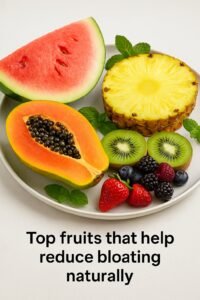
Bloating is one of the most common digestive complaints—whether it’s from overeating, food sensitivities, or slow digestion. But before turning to pills or detox teas, nature already offers simple, powerful solutions. Certain fruits contain enzymes, water, and fiber that help reduce gas, ease discomfort, and get your digestion moving. Here are the top 5 fruits with real anti-bloating power—backed by nutrition science and easy to work into your daily routine.
1. Papaya
Papaya is one of the most effective fruits for reducing bloating. It contains papain, a digestive enzyme that helps your body break down proteins and clear out food faster. This reduces the amount of time food ferments in your gut, which is one of the biggest causes of gas and bloating.
It also delivers water and soluble fiber to help soften stool and prevent constipation, another major bloating trigger. Its gentle nature makes it ideal for people with IBS or sensitive stomachs.
How to eat it: Half a ripe papaya in the morning on an empty stomach is enough to activate its anti-bloating benefits.
2. Pineapple
Pineapple fights bloating on two levels: it contains the enzyme bromelain, which breaks down protein, and it’s high in fluid to support digestion. Bromelain has been shown to ease stomach discomfort and reduce inflammation in the gut lining—especially after heavy meals.
Plus, its slightly acidic nature helps stimulate digestive juices, which improves food breakdown and keeps things moving smoothly.
Best use: Fresh-cut pineapple before or after meals helps reduce gas buildup and bloating caused by slow digestion.
3. Kiwi
Small but effective, kiwi contains actinidin, an enzyme that enhances the breakdown of proteins and supports gastric emptying. It’s also a strong source of both soluble and insoluble fiber, which helps regulate bowel movements and reduce water retention.
One study found that eating two kiwis per day improved digestive comfort and stool frequency in adults with chronic constipation—two key factors in bloating.
Best use: Eat two kiwis as a snack between meals, or mix them into a fiber-rich breakfast bowl.
4. Watermelon
Despite being high in natural sugars, watermelon is mostly water—over 90%. This makes it a great fruit for flushing excess sodium from the body, which is one of the main causes of belly bloat due to water retention.
It also contains citrulline, a natural compound that helps improve circulation and may reduce intestinal inflammation. While it’s not high in fiber, it’s perfect for hydrating and debloating—especially in hot weather.
How to eat it: A cold slice of watermelon mid-morning or as a post-meal refreshment helps rehydrate and reduce bloating fast.
5. Berries
Berries like blueberries, strawberries, and raspberries are rich in antioxidants, fiber, and water—all crucial for fighting bloat. Their fiber helps move waste through the intestines, while their polyphenols reduce gut inflammation and support healthy digestion.
They’re also low in fructose compared to other fruits, which means they’re less likely to cause gas in people who are sensitive to sugar alcohols or FODMAPs.
Best use: Add a handful of berries to oatmeal, yogurt, or salads. Frozen or fresh, they’re equally effective.
🍽️ How to Build a Bloat-Free Fruit Routine
You don’t need to eat all five fruits daily—just mix and match two or three consistently. Here’s a sample daily combo for anti-bloating support:
-
Morning: Half a papaya or one banana
-
Midday: Two kiwis or a cup of mixed berries
-
Evening snack: A slice of watermelon or a few chunks of pineapple
Stay hydrated throughout the day to keep fiber moving, and avoid combining fruits with high-fat or heavy meals when bloating is already present.
❓FAQ
Q: What fruit is best for bloating?
A: Papaya, pineapple, and kiwi stand out for their natural enzymes. Watermelon and berries help flush excess water and support smooth digestion.
Q: Can fruit actually reduce gas?
A: Yes. Fruits rich in enzymes and fiber can speed up digestion and reduce fermentation, which leads to less gas and bloating.
Q: Are there fruits that cause bloating?
A: Yes. Dried fruits, grapes, and apples can cause bloating in people sensitive to FODMAPs. Stick with enzyme-rich or water-heavy fruits for better results.